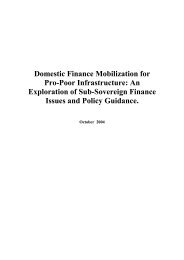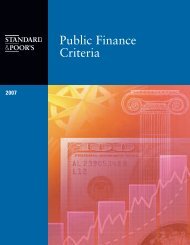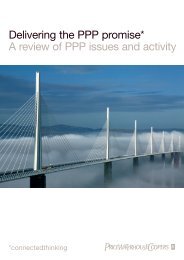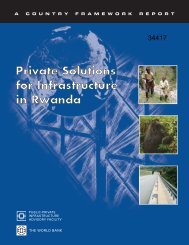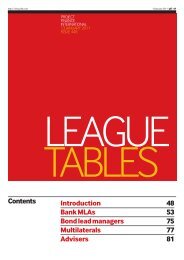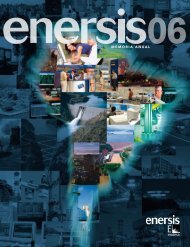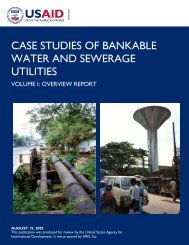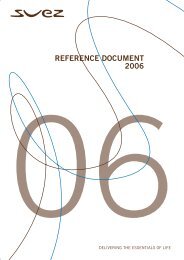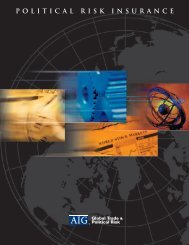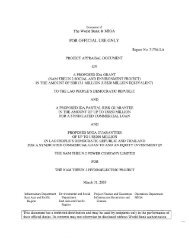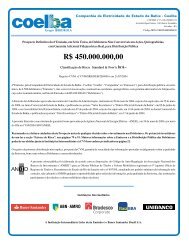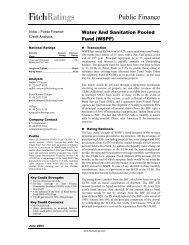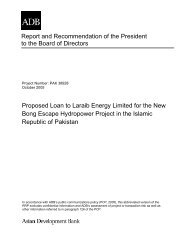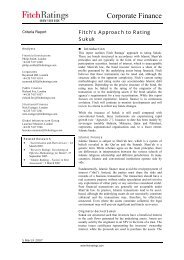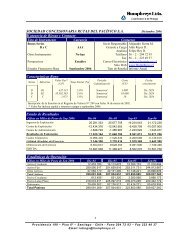EAP - The Pacific Infrastructure Challenge - World Bank (2006).pdf
EAP - The Pacific Infrastructure Challenge - World Bank (2006).pdf
EAP - The Pacific Infrastructure Challenge - World Bank (2006).pdf
Create successful ePaper yourself
Turn your PDF publications into a flip-book with our unique Google optimized e-Paper software.
Many <strong>Pacific</strong> countries already outsource the construction of new roads. <strong>The</strong>se contracts<br />
include a post-construction maintenance period. This period is normally up to a year 70 .<br />
Countries could consider extending this period to help to reduce the maintenance burden on<br />
governments and provide incentives for durable construction.<br />
Regulation and Enforcement for Road Operations<br />
Studies and anecdotal evidence suggests that heavy vehicle overloading is a recurrent<br />
problem in many <strong>Pacific</strong> countries. Reasons for this problem include ineffective law<br />
enforcement, lack of vehicle inspection facilities and irresponsible driver behavior.<br />
Policies to address heavy vehicle overloading, traffic regulations and enforcement are as<br />
important as road maintenance. Fiji has implemented a number of initiatives to reduce<br />
overloading. <strong>The</strong> Government plans to install weighing stations at 18 sites with ADB<br />
funding, and has set up a Traffic and Road Safety Unit under a technical assistance project to<br />
identify and address all road safety and traffic management issues. Despite this, overloading<br />
remains a problem, and under existing road use charging systems, there is a low level of cost<br />
recovery for medium and heavy trucks relative to the damage caused to road pavements 71 .<br />
Overloading is an issue in other <strong>Pacific</strong> countries as well. In the Marshall Islands, proposals<br />
have been made to introduce a ‘road damage charge’ on heavy vehicles based on their laden<br />
axle weight, but this has yet to be implemented as it has not found favor with many road<br />
users. This concept is similar to that of the weighbridges in Fiji and is common policy in<br />
other countries like New Zealand and the USA.<br />
Cost Recovery and Commercial Autonomy<br />
In addition to outsourcing, road departments could benefit further from an increased<br />
commercial focus. This can be achieved by corporatizing the road department, and giving it<br />
control of its own budget and accounting, such as is being proposed for Fiji. Under this<br />
model, the road authority must be allowed to recover the costs of operation through vehicle<br />
licensing and registration, fuel taxes, vehicle loading charges. Countries that have a low road<br />
user base due to low vehicle numbers may not be able to cover the total maintenance costs<br />
in this way. Governments in these countries may need to continue to provide a subsidy for<br />
road maintenance from the domestic budget. <strong>The</strong>se subsidies should be made explicit and<br />
the road authority or department and contractors made accountable for quality of service<br />
under the subsidy.<br />
70 Castalia interviews with Ministries of Works in Fiji, Kiribati and Samoa<br />
71 Republic of the Fiji Islands 1999 Economic Report, ADB <strong>Pacific</strong> Studies Series, 1999.<br />
122



